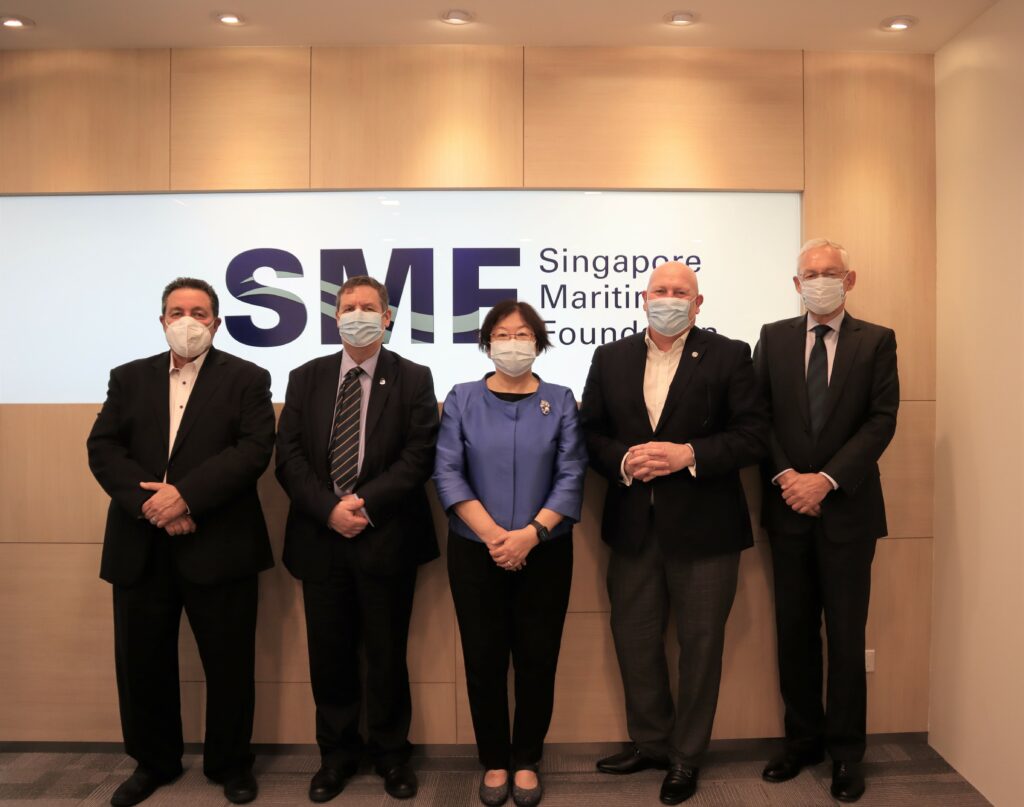7 April, 2022, Singapore – The Maritime Just Transition Task Force founded by the International Chamber of Shipping, the International Transport Workers’ Federation and the UN Global Compact has announced that the Singapore Maritime Foundation has become its first public programme partner.
The Maritime Just Transition Task Force made the announcement at an event during Singapore Maritime Week. The Singapore Maritime Foundation will play a key role in informing the Global Industry Peer Learning Group, and will act as a contributor to the Task Force’s work including its first project on skills in maritime.
It was also announced that the Maritime Just Transition Task Force will launch a report at COP27 in November on the skills needed for a just and equitable green transition in maritime. The report will quantify the number of seafarers that will need to be trained or upskilled to handle the green fuels of the future and the findings will feed into the creation of policy development and provide clear steps for the shipping industry to take.
Established at COP26 in Glasgow, the Task Force founding members also include the UN’s shipping body, the International Maritime Organization and the International Labour Organization. It brings together governments, maritime workers’ unions, and the shipping industry to pursue a fair and equitable green transition in shipping. Its purpose is to ensure that workers’ rights and developing economies’ access to zero-emission vessels and zero-carbon fuels remain at the centre of policy decisions.
Additional industry Project Partners announced at the event included: Anglo-Eastern Ship Management, MSC, Ocean Technologies Group, Ocean Network Express, PTC, and knowledge partners including the World Bank International Finance Corporation (IFC), Mærsk Mc-Kinney Møller Center for Zero Carbon Shipping, the Nigerian Chamber of Shipping, Ocean Conservancy, Carbon Trust and the World Maritime University. The Task Force is also supported by Lloyd’s Register Foundation.
The global shipping industry is responsible for about 3% of global GHG emissions. Reskilling and upskilling the workforce is integral to transitioning industry to a zero-emission value chain of new fuel production and distribution and building the new infrastructure to support it.
Guy Platten, Secretary General of the International Chamber of Shipping remarked:
“People are powering this green transition, and they must be set up for success. This is why we established the Just Transition Taskforce to ensure the seafarer workforce is supported. The first step is to quantify the skills needed for our workforce to be able to safely work on zero- emission vessels. We will collaborate with industry and governments to ensure no seafarer is
left behind, and that developing nations will have equal access to the same training and support.”
“ICS is steadfast in its commitment to ensuring that developing economies are supported so we can make the green transition together.”
Stephen Cotton, General Secretary of the International Transport Workers’ Federation said:
“It is fantastic to have new partners like the Singapore Maritime Foundation joining the task force as its critical work begins to gather steam. Singapore continues to be a key global maritime hub, and it is clear that they want to be part of helping drive this industry transformation.”
“We can only decarbonise shipping if we have the buy-in of all those with an interest in the future of the shipping supply chain.”
“Skills development and retraining is key. But what does that mean if you’re a seafarer? Workers want to know what a just transition means in practical terms for their jobs, for health and safety. That’s why the top research priority of the taskforce is to calculate the number and kinds of jobs that will be needed for the fuels and ships of the future. Our members are looking forward to seeing the results later this year.”
Sanda Ojiambo, CEO and Executive Director, UN Global Compact remarked:
“As the global community works to urgently halve emissions by 2030 to ensure a 1.5°C future, we must ensure the transition is just, equitable and inclusive, involving governments, unions and the private sector in continuous dialogue. With over 87 million people employed by our nearly 14,000 Participant companies, the UN Global Compact is uniquely positioned to scale the collective global impact of business to support a just transition.
Guided by our recently launched Think Lab on Just Transition , the Maritime Just Transition Task Force and its Industry Peer Learning Group consisting of shipping companies, seafarer unions and international organizations represents the best of sectoral social dialogue which is fundamental for the Just Transition. As the first global group of such a nature, we hope it can be a blueprint for other sectors in transition”
Ms. Beng Tee Tan, Executive Director of the Singapore Maritime Foundation noted:
“Maritime Singapore is making a decisive transition towards sustainable shipping. As a conduit to connect the public and private sectors across the entire maritime ecosystem, the Singapore Maritime Foundation is privileged to be the first programme partner of the Maritime Just Transition Taskforce and to contribute to this global conversation. We recognise that sustainable shipping requires a workforce equipped with new skills. A key challenge therefore is to identify the suite of skills required for new talent, and how to reskill the existing workforce. This collaborative effort speaks much about the desire of the global maritime industry to come together to address the urgent task of preparing a talent pool to support the sector’s transformation in the years ahead.
Kitack Lim, Secretary General of the International Maritime Organization affirmed:
“A just transition in the maritime sector entails ensuring everyone involved is equipped with the necessary skills and that no one is left behind in this process. Given the international nature of shipping, we need to engage worldwide with all stakeholders. All of the workforce involved in shipping, but especially the people at the heart of it, the seafarers, need to be a part of this transition. The outcome of the Just Transition Maritime Task Force, is vital to the ongoing processes at IMO related to the future workforce, in particular, the upcoming discussions on a comprehensive review of IMO’s International Convention for the Standards of Training, Certification, and Watchkeeping for Seafarers (STCW Convention). I look forward to continued work in collaboration with the relevant stakeholders.”
Guy Ryder, Director General, International Labour Organization
“The Maritime Just Transition Task Force represents the best of sectoral social dialogue. It echoes the tripartite approach set out in the ILO’s 2015 Guidelines for a just transition towards environmentally sustainable economies and societies for all, taking a human-centred approach to achieving green shipping.”






